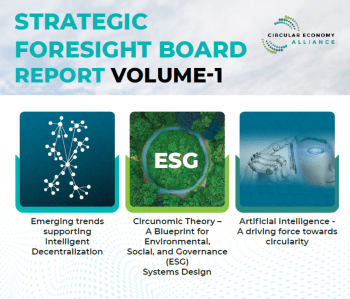
Want to dig deeper into emerging trends around the circular economy? This report from the Circular Economy Alliance unpacks 3 topics – Intelligent Decentralization; Circularity and ESG; and how Artificial Intelligence can support a circular economy.
Catherine Weetman says “It was a great privilege to work on this with Walter R. Stahel, expanding on Intelligent Decentralization, one of the important concepts from his decades of ideas and leadership on the circular and performance economy.”
The report covers:
Emerging trends supporting Intelligent Decentralization
The drawbacks of centralized, mass-manufacturing with big production batches and large-scale systems span economic, societal, technological, and political factors with negative implications on a global scale.
Intelligent Decentralization solutions are technology-enabled, small-scale, locally relevant, and suitable for businesses, public services, individuals, and community groups. These solutions are responsive, improve overall resilience and efficiency, and reduce negative ecological impacts.
Circunomic Theory – A Blueprint for Environmental, Social, and Governance (ESG) Systems Design
The Circular Economy is an economic model based on environmental, social, and governance (ESG) principles to deliver regenerative solutions and influence behaviors throughout the value chain. The economic benefits of a Circular Economy are largely dependent on the overall merit and success of the ESG practice or the circular concept integration.
Artificial Intelligence – A driving force towards circularity
AI technologies enable significant impact across a wide range of applications in various industries, such as medical science and healthcare, education, food production and distribution, efficient public and private transportation, and ultimately in tackling climate change. If applied properly, AI could be transformative and help accelerate the move towards a fairer and more efficient Circular Economy.
Read and download the full report on the Circular Economy Alliance website.
In 2022, Catherine Weetman was invited to join the Strategic Foresight Board of the Circular Economy Alliance (CEA). The CEA provides professionals and organizations with comprehensive, accredited, reliable, actionable skills and knowledge to become agents of change by implementing circular economy practices.
The Strategic Foresight Board aims to provide insights on the current developments and future trends, key drivers and barriers to the Circular Economy, provide strategic guidance to the leadership of Circular Economy Alliance and develop and enhance strategic partnerships with the international business, academic and policy community. The board is chaired by Dr Mark Esposito, and fellow board members include Professor Walter Stahel, one of the ‘founding fathers’ of the circular economy.